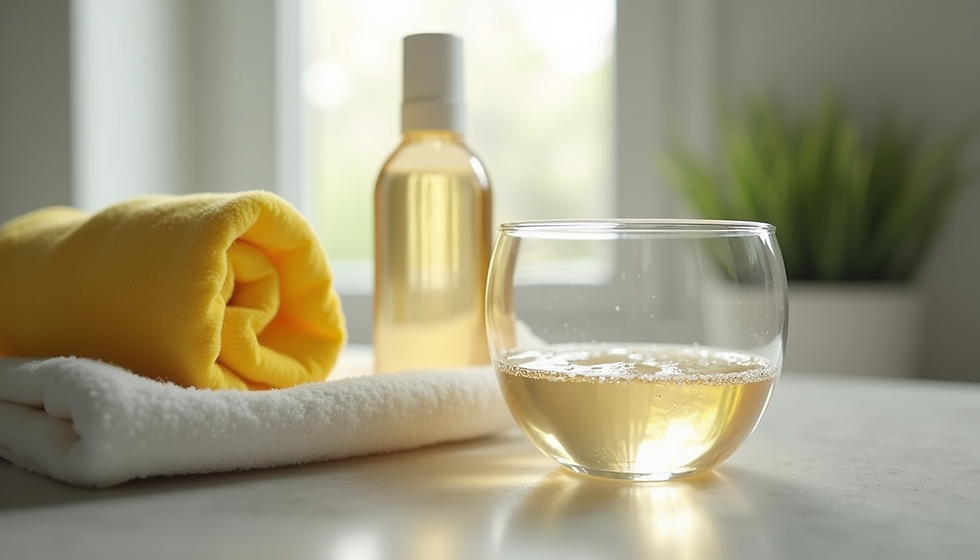What to Expect from a Residential Cleaning Course
- judith8224
- Oct 9, 2025
- 3 min read
When you decide to take a residential cleaning course, you are stepping into a world of practical skills and efficient techniques designed to make cleaning easier, faster, and more effective. These courses are tailored to teach you how to handle everyday cleaning tasks with confidence, using gentle yet powerful products like vinegar, Tide, and dish soap. Whether you want to improve your own home cleaning routine or start a professional cleaning service, this course will equip you with the knowledge and skills you need.
Understanding the Structure of a Cleaning Course
A well-organized cleaning course breaks down the cleaning process into manageable sections. You will learn about different types of surfaces, the best cleaning agents for each, and how to avoid damage while achieving a spotless finish. The course usually starts with the basics:
Introduction to cleaning products: Learn why vinegar, Tide, and dish soap are preferred for their effectiveness and gentleness.
Tools and equipment: Discover the right tools for each task, from microfiber cloths to mops and brushes.
Cleaning techniques: Master methods like dusting, scrubbing, and polishing to get the best results.
The course also emphasizes safety and efficiency, teaching you how to clean without wasting time or resources. You will practice step-by-step routines that can be adapted to any home environment.

What You Will Learn in a Cleaning Course
The heart of the course is the hands-on training. You will gain practical experience in:
Surface-specific cleaning: Different surfaces require different approaches. For example, hardwood floors need gentle cleaning with a vinegar solution, while kitchen counters might require a stronger detergent like Tide.
Stain removal: Learn how to tackle common stains using household products without harsh chemicals.
Bathroom and kitchen sanitation: These areas need special attention to prevent germs and maintain hygiene.
Time management: Efficient cleaning means knowing what to clean first and how to move through a space quickly.
The course also covers how to maintain cleaning tools and products to extend their lifespan and effectiveness. You will be encouraged to ask questions and share your own cleaning challenges, making the learning experience interactive and personalized.

Practical Tips and Techniques for Everyday Cleaning
One of the most valuable parts of the course is the collection of practical tips you can use immediately. For example:
Use a mixture of vinegar and water to clean windows and mirrors without streaks.
Apply a small amount of dish soap to remove grease from kitchen surfaces.
Use Tide detergent diluted in water for tough carpet stains.
Always clean from top to bottom to avoid re-cleaning surfaces.
Let cleaning solutions sit for a few minutes on tough spots before scrubbing.
These tips are designed to save you time and effort while ensuring your home stays fresh and clean. The course also teaches you how to customize cleaning routines based on the size and layout of the home.

How a Residential Cleaning Course Can Benefit You
Taking a residential cleaning course offers many advantages beyond just learning how to clean. It builds confidence and professionalism, especially if you plan to work in the cleaning industry. You will:
Gain a thorough understanding of cleaning products and their uses.
Develop efficient cleaning habits that save time and energy.
Learn to handle delicate surfaces without damage.
Improve your ability to organize and prioritize cleaning tasks.
Receive guidance from trained professionals who support your learning journey.
This course is ideal for anyone who wants to elevate their cleaning skills, whether for personal satisfaction or career development.
Moving Forward with Your Cleaning Skills
After completing the course, you will be ready to apply your new skills in real-life situations. You might find yourself cleaning your home more effectively or even starting a cleaning business with confidence. Remember, the key to success is practice and consistency. Keep using the gentle cleaning products and techniques you learned, and you will see lasting results.
If you want to deepen your knowledge or specialize further, consider advanced courses or workshops that focus on specific areas like upholstery cleaning or eco-conscious product alternatives.
Taking a residential cleaning course is a smart investment in your skills and your environment. It empowers you to maintain a clean, healthy, and welcoming home with ease.




Comments